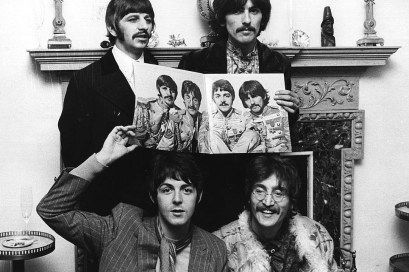I know what you’re thinking, how can I come along and open with a title so abrupt and emphatic, about something so widely argued for decades. The Beatles’ Sgt. Pepper’s Lonely Hearts Club Band has been deemed by many critics as one of the greatest albums in history (if not all-time) and I understand why. At the time it was released, May of 1967, no one had expected that the newest Beatles album was going to be a clever concept  album featuring a band-within-a-band theme. The album is about a fictional character – Sargent Pepper of course – who is performing with his band – The Lonely Hearts Club Band – and an orchestra. This make-believe rock band performed to a generated audience which can be heard in the background of certain tracks.
album featuring a band-within-a-band theme. The album is about a fictional character – Sargent Pepper of course – who is performing with his band – The Lonely Hearts Club Band – and an orchestra. This make-believe rock band performed to a generated audience which can be heard in the background of certain tracks.
Over half a millennium has passed since the initial release of Sgt. Pepper, yet the debate continues about whether other great albums should have a shot at the number one spot or if Sgt. Pepper should stay unparalleled.
Sgt. Pepper is known for being the first at many things: it was the first to win Best Album at the Grammys, first album to flow seamlessly from start to finish with no pauses, first full length album (LP) to be released without a single (45-rpm), one of the first concept albums ever made, and it was released only nine months after their previous masterpiece that is Revolver. Beatles fans were expecting a legendary album to follow Revolver – because how could The Beatles do otherwise – and that’s exactly what came when Sgt. Pepper hit the record store shelves in May, 1967. Maybe it was the pressure of the time or the closeness of the two masterpieces that just make each and its other seem so much greater. Perhaps to stand alone would be a different story.
However, compared to Revolver, Sgt. Pepper was an entirely different, and distinctly more artistic, approach at creating an album. It was seen as a piece of art; a chronology of songs that told a story together (supposedly). The Beatles had a massively diverse influence including genres such as: theatrical music hall, Eastern and Western classical, rock ‘n’ roll and even the blues.


The advent of new recording studio technology such as multitrack recording and pitch shifting, which could make tracks faster or slower, and could create the overlay of different sounds.
One of the reasons why I don’t think that it should be the best is because the four-piece band had little connection when writing the songs that compile the album. For example, the three songs that play back-to-back on Sgt. Pepper: “Being For the Benefit of Mr. Kite!,” “Within You Without You” and “When I’m Sixty-Four” are songs that I know were composed separately by separate Beatles and do not relate to each other whatsoever. Concept albums are supposed to continue telling a story, and I feel as though at times the concept gets lost. “Mr. Kite” was a John Lennon song, while “Within You Without You” a George Harrison, and “When I’m Sixty-Four” a Paul McCartney song. Each features its own theme and style.
Works Cited
Havers, Richard. “50 Facts About The Beatles’ Sgt Pepper Album.” U Discover
Music, 5 May 2017, http://www.udiscovermusic.com/stories/
the-beatles-sgt-pepper/.

